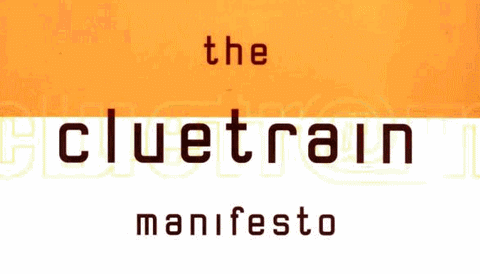This is the third post in my talking back to, and around, the Cluetrain Manifesto theses. Enjoy!
As with my other posts in this area, I’m taking the Cluetrain Manifesto theses from all over the place. It’s a far more interesting way to theorise a contemporary workplace (and workforce) than simply taking it at face value. For, if there is one thing that the Manifesto teaches us, it’s not to take anything at face value: it’s about engagement and discussion.
The title of this piece is demanding. It brings to mind images of nasty little Gen-Me people jumping up and down yelling and screaming because they want attention and their mummies and daddies didn’t give them enough when they were growing up. In many respects, let’s be honest, that is probably why many of this generation are attention-whores. And that is why pinning their attention-span down is difficult. It doesn’t want to be let down again, and subconsciously it knows it will be.
And as I’ve hinted in past essays of this nature, these people can spot fakeness a million miles away. They also know a power-tripping, arrogant boss when they see one. They don’t stay in your workplace very long? Have a long, hard look at your management style and work out whether that’s a problem with them or a problem with your ability to change the way you do things.
As the Manifesto tells us,
Command-and-control management styles both derive from, and reinforce, bureaucracy, power-tripping, and an overall culture of paranoia.
A lot of companies have already grasped this notion and have moved beyond it. Too many haven’t yet. Needless to say, if you want loyal employees, paranoia and power-tripping is the first place to start alienating them. Wondering why your employees aren’t having an open conversation on your intranet discussion boards? Probably because you’ve made them so scared of their own shadow that they won’t voice an opinion; or because you seem to speak a different language. It’s great for your position, and your income, and it’s completely shit for the future of your company or organisation.
Give that some thought.
The point is,
As markets, as workers, we wonder why you’re not listening. You seem to be speaking a different language.
The inflated self-important jargon you sling around … what’s that got to do with us?
Maybe your impressing your investors. Maybe you’re impressing Wall Street. You’re not impressing us.
If you don’t impress us, your investors are going to take a bath. Don’t they understand this? If they did, they wouldn’t let you talk that way.
Now, I want you to get past the specific language of companies here. If you run a community organisation, or a not-for-profit, or a department in a government somewhere, replace ‘investors’ with ‘Board of Governance’, or ‘community’. Or, replace ‘market’ with ‘community’ or ‘target audience’.
The point is, you might be slinging around all sorts of jargon that makes you feel good, that impresses your bosses, investors, or Board. But it ain’t impressing your market, your audience, your community. Or your employees.
Finding it difficult to get people engaged in what you’re trying to do, and you don’t like transparency in the way you run things? Please do not be surprised that people aren’t engaging.
Have you alienated the people you want to discover, engage, and run free with (your audience or your market)? If your employees aren’t talking internally and openly about their own organisation – especially in front of you – then there is a really good chance that your market is playing hard-to-get in a similar way.
Where is the conversation? And what is the conversation? If you can’t hear it, it doesn’t mean that no news is good news. Usually it’s the opposite when it comes to employees and markets – especially if you like a top-down style of managerial approach.
It might be a difficult thing to remember, but it is so important: Just because you’re impressing the people above you, it doesn’t mean that you’re impressing anybody else.
The young generations of kids tend to get this naturally. Engagement is what they do; it’s why they adopt new social technologies early, and why successful companies capitalise on it in all sorts of different ways. Audiences who are older are much the same, because they are allowing themselves to grow into a more networked awareness. Just because they may not start with the same attitude, it doesn’t mean that your older audiences aren’t internetworked, and intranetworked.
They are. And they have been so for over ten years now.
Internets and intranets are not new technologies any more. If you’re in your 50s, it possibly still feels new. But for someone like me (I’m in my 30s), I’ve been using the internet for over half of my life. Get with the program already.
So with this in mind, how are you going to engage your audience, regardless of age?
We are immune to advertising. Just forget it.
If you want us to talk to you, tell us something. Make it something interesting for a change.
Talk to them. Openly. Have a conversation, on your company website, in your organisation’s media. Make it personal, true, heartfelt. Engage people through social networks, and use the networks to work for you. Don’t restrict your networks by solely using locked-down systems (like Facebook); keep an open conversation going on Twitter. Feed it through to a LinkedIn account, to Google+, to Facebook, to wherever you are. Keep your Facebook pages open so people can post whatever they like, and talk back to them.
It’s likely that you have a website, but the idea of blogs or news items written and posted by your employees without your scrutinising eye scares the shit out of you. You quite likely have no personal stories there; you mostly keep the front of your world sharp, short, shiny, professional. And not at all engaging.
This is where problems begin. If you have something to say to your employees, to your audiences, to your markets, to your communities, the first thing you have to do is shut the hell up. Pay attention. Listen. Then engage them in ways that are beneficial both to you and to your varied audiences. It’s the only way you can move forwards together.


